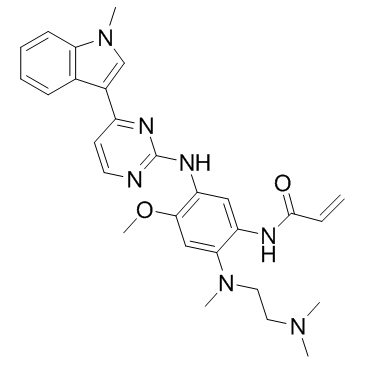1421373-65-0
| Name | azd9291 |
|---|---|
| Synonyms |
2-Propenamide, N-[2-[[2-(dimethylamino)ethyl]methylamino]-4-methoxy-5-[[4-(1-methyl-1H-indol-3-yl)-2-pyrimidinyl]amino]phenyl]-
Osimertinib N-(2-{[2-(Dimethylamino)ethyl](methyl)amino}-4-methoxy-5-{[4-(1-methyl-1H-indol-3-yl)-2-pyrimidinyl]amino}phenyl)acrylamide UNII-3C06JJ0Z2O Mereletinib AZD-9291 |
| Description | Osimertinib (AZD-9291) is an irreversible and mutant selective EGFR inhibitor with IC50s of 12 and 1 nM against EGFRL858R and EGFRL858R/T790M, respectively. |
|---|---|
| Related Catalog | |
| Target |
EGFRL858R:12 nM (IC50, Enzyme assays) EGFRL858R/T790M:1 nM (IC50, Enzyme assays) |
| In Vitro | Osimertinib (AZD-9291) shows similar potency to early generation tyrosine kinase inhibitor (TKIs) in inhibiting EGFR phosphorylation in EGFR cells harboring sensitising EGFR mutants including PC-9 (ex19del), H3255 (L858R) and H1650 (ex19del), with mean IC50 values ranging from 13 to 54 nM for AZD-9291. Osimertinib (AZD-9291) also potently inhibits phosphorylation of EGFR in T790M mutant cell lines (H1975 (L858R/T790M), PC-9VanR (ex19del/T790M), with mean IC50 potency less than 15 nM[1]. |
| In Vivo | The tumor-bearing mice are treated with Osimertinib (AZD-9291) (5 mg/kg/day) for one to two weeks. Within days of treatment, 5 of 5 C/L858R mice displays nearly 80% reduction in tumor volume by magnetic resonance imaging MRI after therapy with Osimertinib (AZD-9291), while 5 of 5 mice treated with vehicle shows tumor growth[1]. Osimertinib (AZD-9291) demonstrates improved rat PK, reduced hERG affinity, and improved IGF1R margins relative to the previously described compounds, and so this compound is selected for further investigation. Osimertinib (AZD-9291) also offers an additional degree of broader chemical and profile diversity when compared to the previously described lead compounds. Upon dosing Osimertinib (AZD-9291) in three efficacy models, The comparable efficacy is observed at relatively low doses (10 mg/kg per day). The excellent efficacy is also observed when Osimertinib (AZD-9291) is dosed at 5 mg/kg per day[2]. |
| Cell Assay | PC-9 cells are seeded into T75 flasks (5×105 cells/flask) in RPMI growth media and incubated at 37°C, 5% CO2. The following day the media is replaced with media supplemented with a concentration of EGFR inhibitor equal to the EC50 concentration predetermined in PC-9 cells. Media changes are carried out every 2-3 days and resistant clones allowed to grow to 80% confluency prior to the cells being trypsinised and reseeded at the original seeding density in media containing twice the concentration of EGFR inhibitor. Dose escalations are continued until a final concentration of 1.5 μM Gefitinib, 1.5 μM Afatinib, 1.5 μM WZ4002 or 160 nM Osimertinib (AZD-9291) are achieved[1]. |
| Animal Admin | Mice[1] The EGFRL858R and EGFRL858R+T790M mice (male and female) are used. Osimertinib (AZD-9291) is suspended in 1% Polysorbate 80 and administered via oral gavage once daily at the doses of 7.5 mg/kg and 5 mg/kg, respectively. Mice are imaged weekly at the Vanderbilt University Institute of Imaging Science. For immunoblot analysis, mice are treated for eight hours with drug as described before dissection and flash freezing of the lungs. Lungs are pulverized in liquid nitrogen before lysis. Rats[2] The male RccHan:WIST rats (10-week-old) are received a single oral dose of Osimertinib (AZD-9291) (200 mg/kg). Blood glucose levels are measured using an Accuchek Active meter. Serum insulin concentrations are determined using a commercial rat ELISA kit. |
| References |
| Density | 1.2±0.1 g/cm3 |
|---|---|
| Molecular Formula | C28H33N7O2 |
| Molecular Weight | 499.607 |
| Exact Mass | 499.269562 |
| PSA | 87.55000 |
| LogP | 3.30 |
| Index of Refraction | 1.618 |
| HS Code | 29339900 |
|---|

